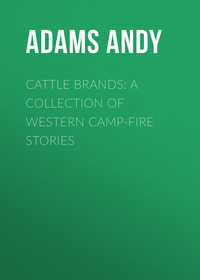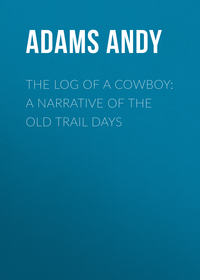 полная версия
полная версияThe Outlet
On the morning of the 25th of September, 1884, the two outfits started for the railroad, leaving the remainder of us in a country, save for the cattle, so desolate that there was no chance even to spend our wages. I committed to memory a curtain lecture for my brother, though somehow or other it escaped me and was never delivered. We rode lines between the upper and lower wagons, holding the cattle loosely on a large range. A delightful fall favored us, and before the first squall of winter came on, the beeves had contented themselves as though they had been born on the Little Missouri. Meanwhile Bob's wagon and remuda arrived, the car of corn was hauled to our headquarters, extra stabling was built, and we settled down like banished exiles. Communication had been opened with Fort Buford, and in the latter part of October the four promised men arrived, when Bob Quirk took part of my outfit and went home, leaving me ten men. Parent remained as cook, the new men assimilated easily, a fiddle was secured, and in fulfillment of the assertion of Sanders, we picked up courage. Two grain-fed horses, carefully stabled, were allowed to each man, the remainder of our large number of saddle stock running free on the range.
To that long winter on the Little Missouri a relentless memory turns in retrospect. We dressed and lived like Eskimos. The first blizzard struck us early in December, the thermometer dropped sixty degrees in twelve hours, but in the absence of wind and snow the cattle did not leave the breaks along the river. Three weeks later a second one came, and we could not catch the lead animals until near the railroad; but the storm drove them up the Little Missouri, and its sheltering banks helped us to check our worst winter drift. After the first month of wintry weather, the dread of the cold passed, and men and horses faced the work as though it was springtime in our own loved southland. The months rolled by scarcely noticed. During fine weather Sanders and some of his boys twice dropped down for a few days, but we never left camp except to send letters home.
An early spring favored us. I was able to report less than one per cent. loss on the home range, with the possibility of but few cattle having escaped us during the winter. The latter part of May we sold four hundred saddle horses to some men from the upper Yellowstone. Early in June a wagon was rigged out, extra men employed, and an outfit sent two hundred miles up the Little Missouri to attend the round-ups. They were gone a month and came in with less than five hundred beeves, which represented our winter drift. Don Lovell reached the ranch during the first week in July. One day's ride through the splendid cattle, and old man Don lost his voice, but the smile refused to come off. Everything was coming his way. Field, Radcliff & Co. had sued him, and the jury awarded him one-hundred thousand dollars. His bankers had unlimited confidence in his business ability; he had four Indian herds on the trail and three others of younger steers, intended for the Little Missouri ranch. Cattle prices in Texas had depreciated nearly one half since the spring before—"a good time for every cowman to strain his credit and enlarge his holdings," my employer assured me.
Orders were left that I was to begin shipping out the beeves early in August. It was the intention to ship them in two and three train-load lots, and I was expecting to run a double outfit, when a landslide came our way. The first train-load netted sixty dollars a head at Omaha—but they were beeves; cods like an ox's heart and waddled as they walked. We had just returned from the railroad with the intention of shipping two train-loads more, when the quartermaster and Sanders from Fort Buford rode into the ranch under an escort. The government had lost forty per cent. of the Field-Radcliff cattle during the winter just passed, and were in the market to buy the deficiency. The quartermaster wanted a thousand beeves on the first day of September and October each, and double that number for the next month. Did we care to sell that amount? A United States marshal, armed with a search-warrant, could not have found Don Lovell in a month, but they were promptly assured that our beef steers were for sale. It is easy to show prime cattle. The quartermaster, Sanders, and myself rode down the river, crossed over and came up beyond our camp, forded back and came down the Beaver, and I knew the sale was made. I priced the beeves, delivered at Buford, at sixty-five dollars a head, and the quartermaster took them.
Then we went to work in earnest. Sanders remained to receive the first contingent for Buford, which would leave our range on the 25th of each month. A single round-up and we had the beeves in hand. The next morning after Splann left for the mouth of the Yellowstone, I started south for the railroad with two train-loads of picked cattle. Professional shippers took them off our hands at the station, accompanied them en route to market, and the commission house in Omaha knew where to remit the proceeds. The beef shipping season was on with a vengeance. Our saddle stock had improved with a winter in the North, until one was equal to two Southern or trail horses. Old man Don had come on in the mean time, and was so pleased with my sale to the army post that he returned to Little Missouri Station at once and bought two herds of three-year-olds at Ogalalla by wire. This made sixteen thousand steer cattle en route from the latter point for Lovell's new ranch in Dakota.
"Tom," said old man Don, enthusiastically, "this is the making of a fine cattle ranch, and we want to get in on the flood-tide. There is always a natural wealth in a new country, and the goldmines of this one are in its grass. The instinct that taught the buffalo to choose this as their summer and winter range was unerring, and they found a grass at hand that would sustain them in any and all kinds of weather. This country to-day is just what Texas was thirty years ago. All the early settlers at home grew rich without any effort, but once the cream of the virgin land is gone, look out for a change. The early cowmen of Texas flatter themselves on being shrewd and far-seeing—just about as much as I was last fall, when I would gladly have lost twenty-five thousand dollars rather than winter these cattle. Now look where I will come out, all due to the primitive wealth of the land. From sixty to sixty-five dollars a head beats thirty-seven and a half for our time and trouble."
The first of the through cattle arrived early in September. They avoided our range for fear of fever, and dropped in about fifteen miles below our headquarters on the Little Missouri. Dorg Seay was one of the three foremen, Forrest and Sponsilier being the other two, having followed the same route as our herds of the year before. But having spent a winter in the North, we showed the through outfits a chilling contempt. I had ribbed up Parent not even to give them a pleasant word about our wagon or headquarters; and particularly if Bob Quirk came through with one of the purchased herds, he was to be given the marble heart. One outfit loose-herded the new cattle, the other two going home, and about the middle of the month, my brother and The Rebel came trailing in with the last two herds. I was delighted to meet my old bunkie, and had him remain over until the last outfit went home, when we reluctantly parted company. Not so, however, with Bob Quirk, who haughtily informed me that he came near slapping my cook for his effrontery. "So you are another one of these lousy through outfits that think we ought to make a fuss over you, are you?" I retorted. "Just you wait until we do. Every one of you except old Paul had the idea that we ought to give you a reception and ask you to sleep in our beds. I'm glad that Parent had the gumption to give you a mean look; he'll ride for me next year."
The month of October finished the shipping. There was a magic in that Northern climate that wrought wonders in an animal from the South. Little wonder that the buffalo could face the blizzard, in a country of his own choosing, and in a climate where the frost king held high revel five months out of the twelve. There was a tonic like the iron of wine in the atmosphere, absorbed alike by man and beast, and its possessor laughed at the fury of the storm. Our loss of cattle during the first winter, traceable to season, was insignificant, while we sold out over two hundred head more than the accounts called for, due to the presence of strays, which went to Buford. And when the last beef was shipped, the final delivery concluded to the army, Don Lovell was a quarter-million dollars to the good, over and above the contract price at which he failed to deliver the same cattle to the government the fall before.
As foreman of Lovell's beef ranch on the Little Missouri I spent five banner years of my life. In '89 the stock, good-will, and range were sold to a cattle syndicate, who installed a superintendent and posted rules for the observance of its employees. I do not care to say why, but in a stranger's hands it never seemed quite the same home to a few of us who were present when it was transformed into a cattle range. Late that fall, some half-dozen of us who were from Texas asked to be relieved and returned to the South. A traveler passing through that country to-day will hear the section about the mouth of the Beaver called only by the syndicate name, but old-timers will always lovingly refer to it as the Don Lovell Ranch.








